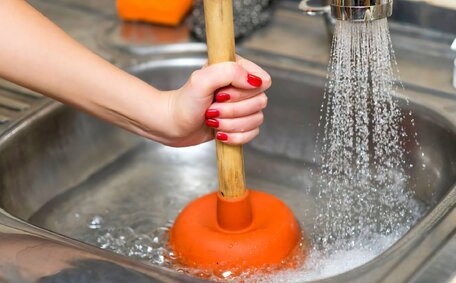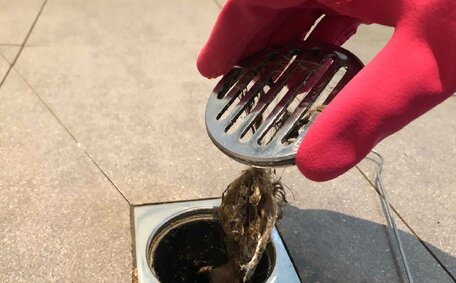Understanding Chemical Drain Cleaners
Liquid chemical drain cleaner solutions are commonly employed in Strathfield, Sydney households and businesses to swiftly address a clogged drain. Despite their rapid ability to unblock drains, chemical cleaners are not always the best choice for drain clearing as they can damage plumbing systems and pose safety hazards without careful use.
There are several types of chemical drain cleaners to be aware of:
- Caustic cleaners - Contain strong acids or bases that act as acid drain openers to eat away at clogs. Highly corrosive.
- Enzyme drain cleaners - Deploy enzymes to break down organic matter. Less harmful but slower.
- Foaming cleaners - Expand to coat pipe walls and push through clogs.
- Granular cleaners - Dissolve over time to clear blockages.
Although sometimes seen as a quick fix, it’s critical to understand both the advantages and dangers of using caustic drain cleaners, which can:
- Damage plastic or metal pipes and plumbing fixtures
- Produce toxic fumes if mixed with other cleaners
- Harm the environment by leaching into groundwater
- Fail to clear all types of clogs, including those caused by tree roots
Instead of resorting to strong chemical drain cleaners, it’s important to recognise that natural cleaners or mechanical methods are often safer and preferable alternatives. We offer a variety of products and services, including expert drain cleaning, to solve complex plumbing issues and tackle clogged drains with tailored solutions.
How Chemical Drain Cleaners Work
Drain cleaning products contain potent compounds that can dissolve blockages, and with expert advice, can be safely used to liquefy even stubborn clogs, such as those caused by tree roots. The active ingredients in products can target types of clogs such as fats, oils, and other organic matter based on the type of cleaner:
- Caustic cleaners use strong acids or bases that essentially "melt" through blockages via an intense chemical reaction.
- Enzymatic cleaners contain enzymes that digest organic material clogs like hair, food, grease.
- Foaming cleaners expand to coat pipes and penetrate clogs.
- Oxidizing drain cleaners utilise agents like sulfuric acid to oxidise and disintegrate obstructions.
Drain cleaners are effective for minor blockages from organic debris, hair, and grease but struggle with severe obstructions such as tree roots or solid objects. They can also potentially damage your pipes over time. Safer methods like employing drain unblockers may be better options.
Pros of Using Chemical Drain Cleaners
There are several benefits to understanding when to use drain cleaners:
- They can swiftly tackle your clog, especially those clearing out your pipes from hair grease, soap scum, and other organic materials, not those caused by tree debris.
- Numerous chemical solutions are economical and engineered to clear out your clogs, ready for use drain deliverance channels from any hardware store.
- They are easy to use with minimal effort required - just pour them with water down into drain passages, let sit, and anticipate the unclogging.
- Heavy duty max gel drain cleaners, sometimes the best drain solutions, may succeed at sending water down the drain to unclog your drains when other methods have failed.
Nonetheless, it’s crucial to be aware of the drawbacks before choosing to use chemical drain cleaners. While they seem like a fast-acting solution, they can ruin your plumbing, pose safety issues, harm the environment, and may not manage a blocked drain effectively.
Our expert team provides support and knowledge to help you discover safer, mechanical cleaning methods that avoid these risks and effectively clear your drains.
Cons of Using Chemical Drain Cleaners
Safety Concerns
These products, especially liquid drain cleaners, contain hazardous chemicals with potential safety risks if misused:
- Mixing certain drain cleaning chemicals can create dangerous gases and reactions, endangering septic tanks. Therefore, it’s imperative not to mix bleach with acidic materials when employing these cleaning agents.
- Chemical burns or skin irritation may occur with direct contact.
- A drain cleaner can damage eyes and mucous membranes on contact.
- Some chemical fumes, particularly those that may affect a septic tank or cesspit, are extremely harmful if inhaled.
Environmental Impact and Risks for Wildlife
You need to know that chemical drain formulas entering our water systems can contaminate waterways, to the detriment of aquatic life and vegetation:
- Ingredients denser than water, such as sulfuric acid, lye, and bleach, are highly toxic.
- Harmful substances can infiltrate the soil and groundwater through the sewer line after prolonged exposure.
Pipe Damage and Corrosion Over Time
Frequent application of chemical drain cleaners can lead to considerable damage:
- Can corrode and damage your pipes, especially due to caustic or acidic components, exacerbating issues like those caused by tree roots.
- Weakening of pipes allowing leaks and collapses.
- Destruction of plastic PVC pipes and plumbing fixtures.
Health Risks from Exposure and Inhalation
Exposure to strong chemical vapours from used drain cleaners poses serious health risks, such as:
- Lung damage or breathing difficulty from inhalation.
- Headaches, nausea, dizziness.
- Risk of chemical burns on skin or eyes.
Instead of jeopardising your tank or cesspit with a chemical cleaner, it’s prudent to engage our plumbing services – delivering safe, effective solutions for freeing your drains.
Alternatives to Chemical Drain Cleaners
Mechanical Drain Cleaning Methods
There are several mechanical devices that can effectively clear blockages in your drainage system without needing harsh chemicals:
- Plungers - Use a forceful plunging action to dislodge blockages.
- Augers/drain snakes - Feed a coat hanger or flexible metal snake down the pipes to hook and extract debris.
- Air blasters - Blasts of compressed air jet through pipes to propel clogs free.
Natural Drain Cleaners
Household items like vinegar and baking soda, even in small quantities, can break down certain types of organic blockages:
- Baking soda and vinegar - Bubbling reaction helps break up grease and grime.
- Boiling water down the drain - Hot water assists in dissolving and dispelling both the standing water and fat/grease accumulations.
- Salt and baking soda - Scours away residue.
Preventative Measures
You can also take steps to avoid clogs forming in the first place:
- Fit your home with drain screens to intercept hair, food particles, and other debris.
- Avoid pouring fats and oils down your sink; instead, use a half cup of baking soda followed by vinegar to prevent strain on your plumbing that could require hydro jetting.
- Apply drain enzymes regularly to prevent and reduce build up.
- Perform regular drain maintenance.
Our professional drain cleaning services are equipped to provide safe and effective maintenance when there’s a need to call a plumber. Contact a professional plumber for customised solutions to your blocked drain issues.





